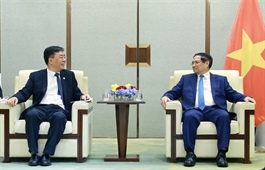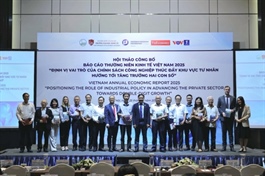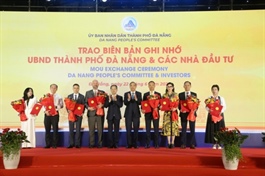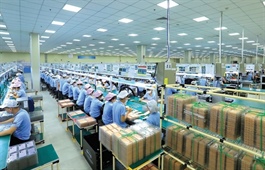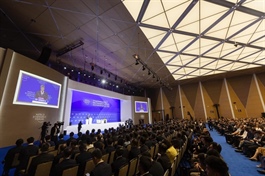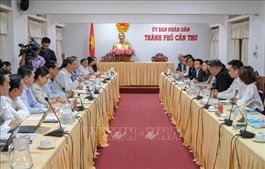Legislative overhaul aims to boost public investment and efficiency
Legislative overhaul aims to boost public investment and efficiency
The National Assembly approved a comprehensive legislative act amending eight major laws on June 25 in a concerted effort to remove legal bottlenecks, enhance governance flexibility, and accelerate project implementation across critical sectors.
The landmark legislative act, commonly referred to as the ‘one law amending eight laws’, received overwhelming support from legislators.
It introduces revisions and supplements to the Law on Public Procurement, the Law on Investment under the Public-Private Partnership Model (PPP Law), the Law on Customs, the Law on Value-Added Tax, the Law on Export and Import Duties, the Law on Investment, the Law on Public Investment, and the Law on Management and Use of Public Assets.
The amended legislation is scheduled to take effect on July 1.
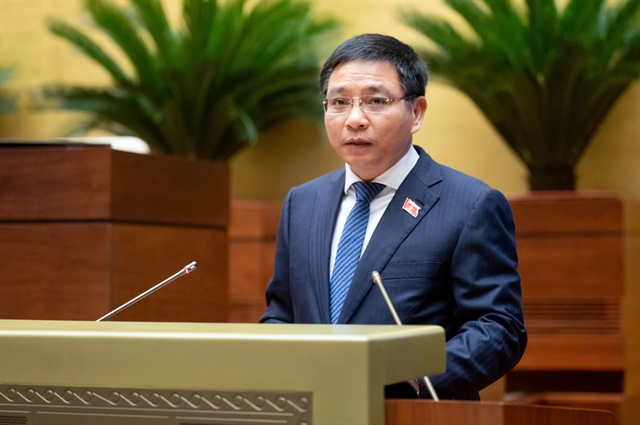
Minister of Finance Nguyen Van Thang presented the comprehensive legislative act to the National Assembly |
Presenting the bill before the National Assembly, Minister of Finance Nguyen Van Thang noted that key amendments to the Law on Public Procurement are designed to grant greater autonomy to state-owned enterprises (SOEs) in procurement activities, specifically for projects that do not use state budget funds.
“SOEs are now allowed to independently determine their contractor selection methods, provided transparency, effectiveness, and accountability are maintained."
"For projects that involve state funding, all procurement activities, regardless of the implementing entity, must still adhere strictly to the Law on Public Procurement,” said Thang.
The landmark law also strengthens oversight mechanisms, aiming to balance SOEs’ autonomy with risk prevention and efficient capital use.
Furthermore, the law grants project owners expanded authority to select simplified procurement methods such as direct appointment, ordering, and special-case selection.
Traditional methods like open bidding and competitive offers remain available, with selection tailored to the scale and nature of each contract.
The scope for applying direct appointment has also been broadened. Meanwhile, the government is tasked with issuing detailed regulations on other procurement methods, a move that is expected to help shorten timelines for public project implementation.
Amendments to the PPP Law introduce more flexible revenue-sharing mechanisms between the state and private investors in build-operate-transfer (BOT), build-transfer-operate (BTO), and build-own-operate (BOO) projects.
Accordingly, if actual revenues exceed 110–125 per cent of projections under the approved financial plan, investors must share 50 per cent of the excess with the state, after adjustments to service fees, pricing, and contract duration.
The specific rate will be determined through negotiation with competent authorities and subject to audit by the State Audit Office.
Conversely, if actual revenues fall to 75-90 per cent of projected levels, the state will cover 50 per cent of the shortfall. However, this loss-sharing mechanism does not apply when the financial plan has been adjusted based on return on equity, loan interest rates, or unfeasible debt repayment terms agreed post-contract.
For PPP projects in science and technology, the law provides further incentives. Investors will not be required to share any revenue surplus for the first three years of operation.
Moreover, if actual revenues fall below projections during this initial phase, the state will entirely compensate the shortfall.
This exceptional policy is aligned with Resolution No. 57-NQ/TW of the Politburo on the breakthroughs in the development of science, technology, innovation, and national digital transformation.
Among the key updates to the Law on Investment is the delegation of authority to provincial people’s committees to approve investment proposals for seven specific types of projects, which previously required the prime minister’s approval.
These include the construction of new airports or terminals with a capacity of at least one million tonnes per year; investment in commercial air transport services; construction of special seaports or ports with investment from $92 million; oil and gas processing projects; housing or urban area development projects covering at least 50 hectares or accommodating at least 15,000 residents; projects using land plots of 100ha or more; or smaller-scale projects with populations exceeding 10,000 residents.
The government is expected to issue a decree providing detailed guidance for implementation, with an emphasis on streamlining administrative procedures for investment approval and issuance of investment registration certificates.
Minister Thang noted that ministries and agencies have been instructed to eliminate at least 30 per cent of unnecessary business and investment conditions, paving the way for a more efficient and investor-friendly business environment.
Experts have praised the comprehensive amendment of eight interrelated laws under a single legislative act as a strategic move, aligned with the country’s broader institutional reform agenda.
It is also seen as crucial for boosting the disbursement of public investment, a key priority for Vietnam’s economic growth.
- 19:19 26/06/2025





